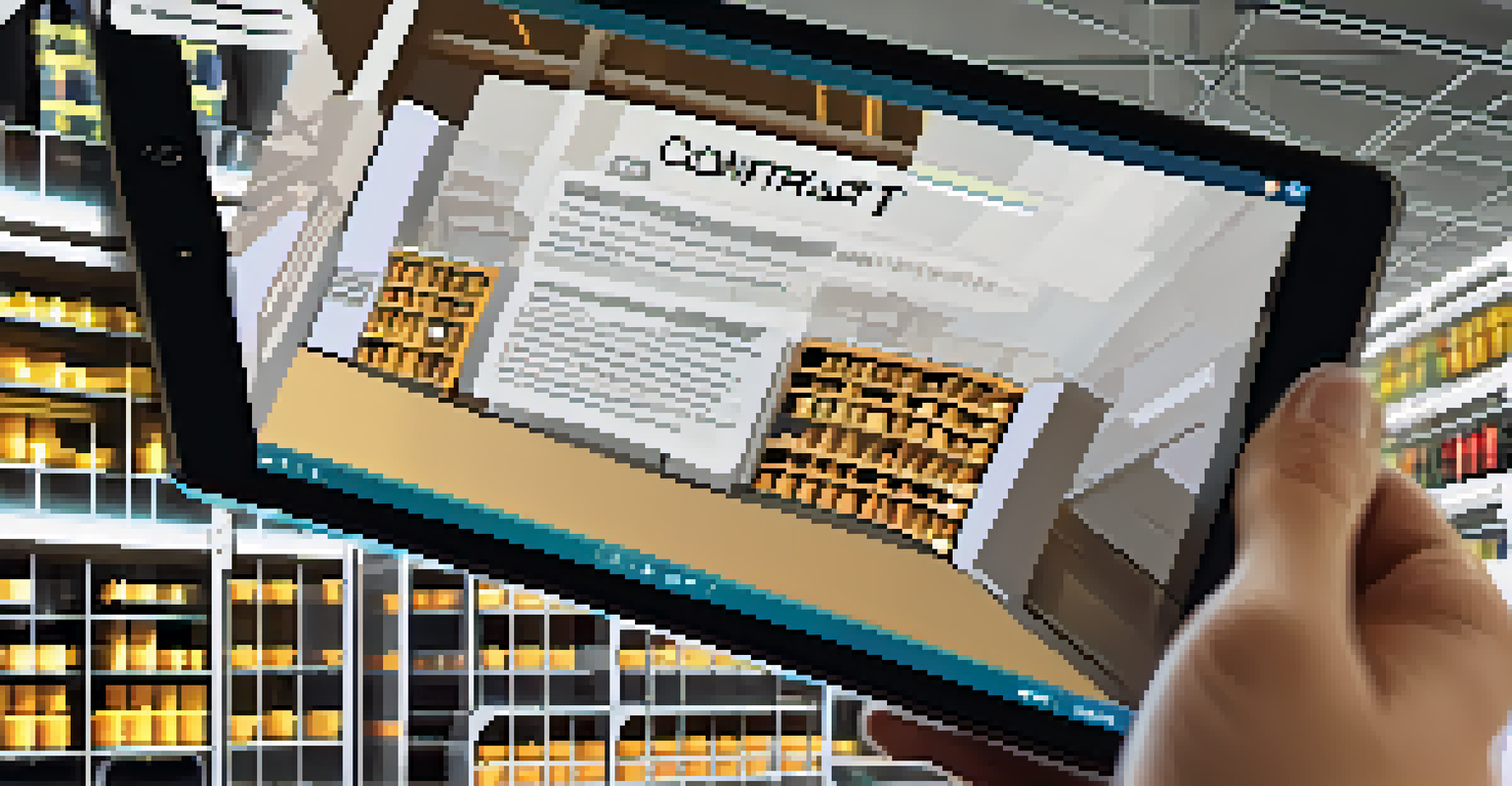Smart Contracts: Revolutionizing Supply Chain Transactions

Understanding Smart Contracts in Supply Chains
Smart contracts are self-executing agreements with the terms directly written into code. They operate on blockchain technology, ensuring transparency and security. In the context of supply chains, these contracts automate processes, reducing the need for intermediaries and minimizing errors.
Smart contracts allow for the automation of business processes, eliminating the need for intermediaries and enhancing trust among parties.
For example, when a product is shipped, a smart contract can automatically release payment once the shipment is verified. This reduces delays and disputes, creating a smoother transaction flow. The automation aspect not only speeds up processes but also enhances trust among parties involved.
By eliminating manual processes and intermediaries, smart contracts can drastically cut down operational costs. This efficiency is crucial in supply chains where time and accuracy are paramount. Overall, understanding smart contracts is the first step in appreciating their impact on supply chain transactions.
Benefits of Using Smart Contracts in Supply Chains
One of the most significant benefits of smart contracts is increased transparency. All parties involved can access the same data in real-time, which minimizes the risk of fraud and discrepancies. This level of transparency fosters trust and collaboration among stakeholders.

Additionally, smart contracts enhance efficiency by automating tasks that typically require human intervention. For instance, inventory management can be streamlined, as stock levels can trigger automatic reorders without manual checks. This reduces the likelihood of stock shortages or overstocking, which can be costly.
Smart Contracts Boost Efficiency
By automating processes and reducing intermediaries, smart contracts significantly enhance operational efficiency in supply chains.
Moreover, the accuracy of smart contracts ensures that transactions are executed exactly as agreed upon. This reduces the chances of disputes, allowing businesses to allocate resources more effectively. In the long run, these benefits can lead to a more resilient and responsive supply chain.
Real-World Examples of Smart Contracts in Action
Several companies are already harnessing the power of smart contracts to optimize their supply chains. For instance, IBM and Maersk have developed TradeLens, a platform that uses blockchain technology to improve shipping efficiency. This collaboration allows for real-time tracking of shipments and automatic updates on contract terms.
Blockchain technology can provide a level of transparency that has never been seen before in supply chains.
Another notable example is Walmart, which has utilized smart contracts to track food products from farms to shelves. This traceability not only improves food safety but also enhances accountability within the supply chain. When a food safety issue arises, Walmart can quickly pinpoint the source of the problem.
These examples illustrate the practical applications of smart contracts, showcasing their potential to revolutionize supply chain management. By providing real-time data and automated processes, these companies are setting new standards in efficiency and transparency.
Challenges in Implementing Smart Contracts
Despite their many advantages, implementing smart contracts is not without challenges. One significant hurdle is the need for all parties to agree on the contract's terms and the coding language used. If stakeholders lack technical expertise, it may lead to misunderstandings or improperly executed contracts.
Additionally, integrating smart contracts into existing supply chain systems can be complex. Organizations may face compatibility issues with current technologies, requiring significant adjustments. This transition can demand time and resources, which some companies may be hesitant to invest.
Transparency Fosters Trust
The real-time access to data provided by smart contracts minimizes fraud and discrepancies, building trust among supply chain stakeholders.
Finally, regulations surrounding blockchain and smart contracts are still evolving. Companies must navigate a landscape that may not be fully supportive of these technologies. Addressing these challenges is crucial for businesses looking to leverage smart contracts effectively.
The Role of Blockchain in Smart Contracts
Blockchain technology serves as the backbone of smart contracts, providing a decentralized and secure environment for transactions. Each contract is recorded on the blockchain, making it immutable and tamper-proof. This ensures that once a contract is executed, it cannot be altered, providing a reliable record for all parties.
Moreover, blockchain's transparency allows all involved parties to view transaction history, further enhancing trust. For example, in a supply chain scenario, everyone can see when a product was shipped, received, or paid for. This transparency can significantly reduce disputes and improve cooperation between stakeholders.
In essence, blockchain technology not only secures smart contracts but also empowers them with features that traditional contracts lack. By leveraging blockchain, businesses can create a more efficient and trustworthy supply chain environment.
Future Trends of Smart Contracts in Supply Chains
Looking ahead, the adoption of smart contracts in supply chains is expected to grow significantly. As more organizations recognize their benefits, we will likely see an increase in innovative applications across various industries. This could lead to enhanced collaboration and smarter decision-making.
One promising trend is the integration of artificial intelligence (AI) with smart contracts. AI can analyze data and predict potential disruptions in the supply chain, allowing contracts to adapt accordingly. This proactive approach can help businesses stay ahead of challenges and maintain efficiency.
Challenges of Implementation
Despite their benefits, integrating smart contracts poses challenges, such as the need for stakeholder agreement on terms and potential compatibility issues.
Furthermore, as regulations surrounding blockchain and smart contracts evolve, we can anticipate clearer guidelines that will facilitate broader adoption. This evolution will likely lead to a more standardized approach, making it easier for companies to implement smart contracts seamlessly.
Conclusion: Embracing Smart Contracts for Efficiency
In conclusion, smart contracts have the potential to revolutionize supply chain transactions by enhancing efficiency, transparency, and trust. As organizations continue to explore this technology, the benefits will become increasingly clear. The ability to automate processes and reduce the risk of fraud can lead to substantial savings and improved relationships among stakeholders.
However, companies must also be aware of the challenges involved in implementing smart contracts. By addressing these obstacles head-on, businesses can harness the full potential of this technology. As we move forward, embracing smart contracts will be crucial for organizations looking to stay competitive in the ever-evolving landscape of supply chain management.

Ultimately, the future of supply chains may very well depend on the widespread adoption of smart contracts. By fostering collaboration and efficiency, these innovative agreements can reshape how businesses operate, driving growth and success.